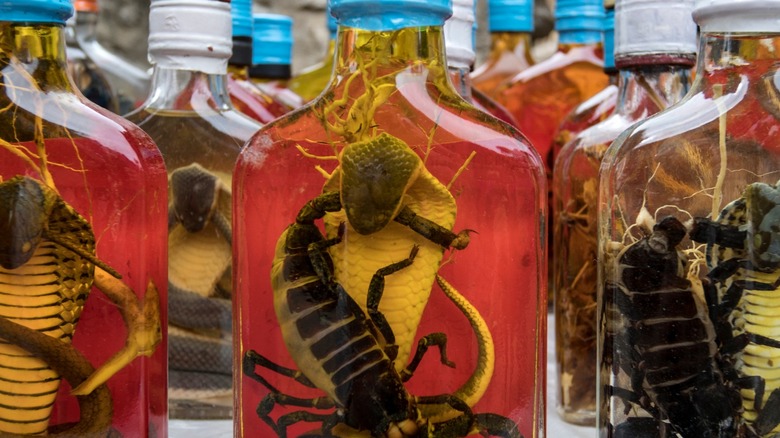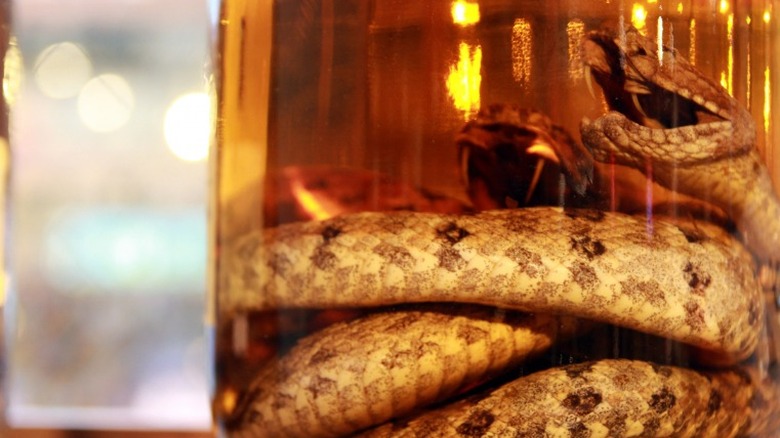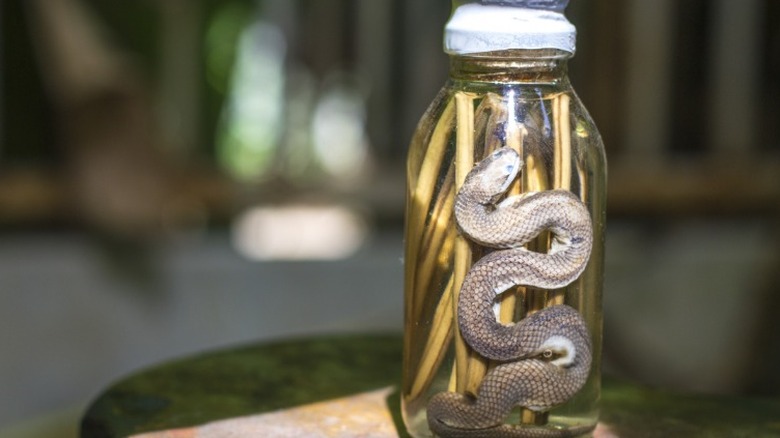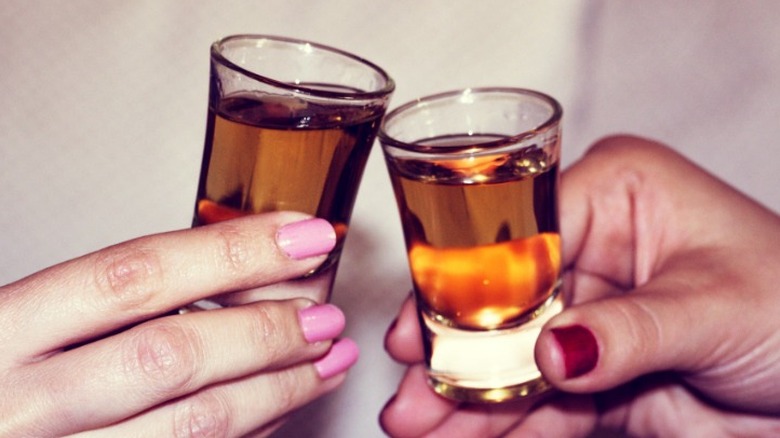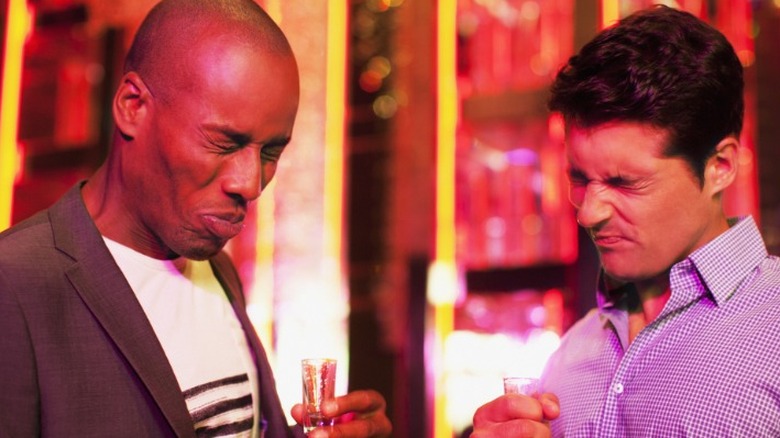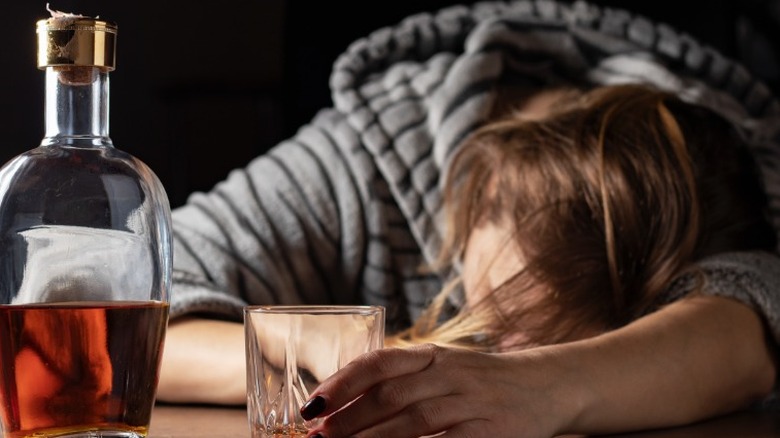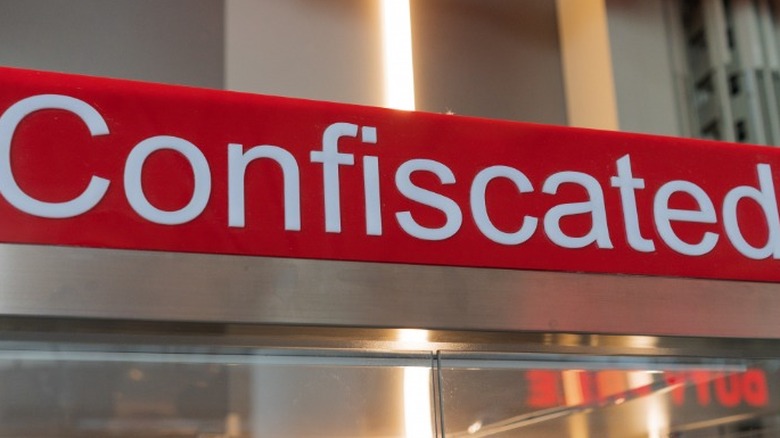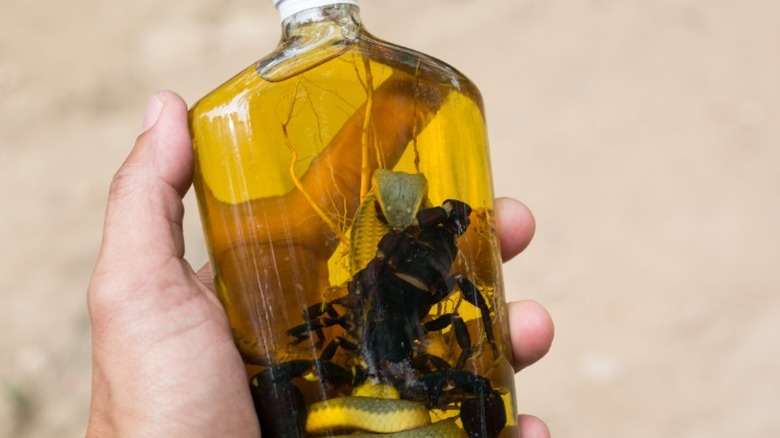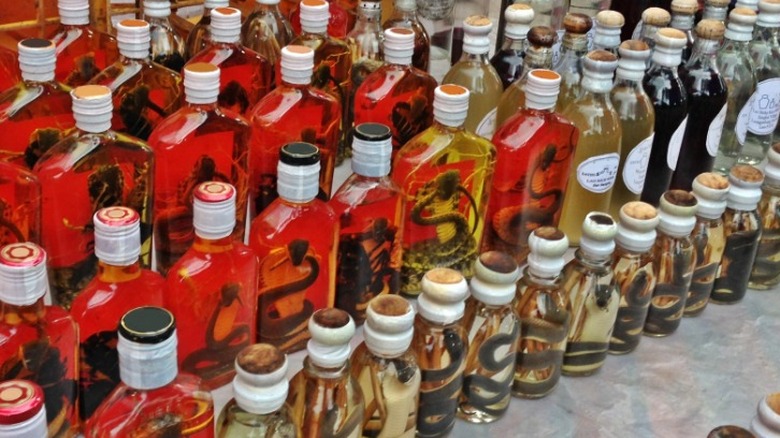What Is Snake Whiskey?
We may receive a commission on purchases made from links.
When people hear about snake whiskey for the first time, their eyes may widen in disbelief. Then, the fear sets in. Images of hissing rattlers, copperheads, and dangerous-looking people holding glasses of scary-looking amber liquid might come to mind. You might be familiar with worms in tequila, which can conjure up similarly frightening thoughts. Smartblend explains that those worms are dead, edible moth larvae (gross) that don't contribute anything to the drink's taste.
And it's certainly not the only one, as far as alcohol marketing goes: introducing snake whiskey.
Snake (or cobra) whiskey is a drink most common in Laos and Thailand, and it has been lugged back by Western tourists as a souvenir for quite some time. The gruesome drink is infused with a real cobra snake, often ginseng roots and seed pods (via Los Angeles Times). Its roots can be traced back to Chinese medicine, and it's claimed that this whiskey cures hair loss, rheumatoid arthritis, and other ailments. Many also believe that it's an aphrodisiac.
Is snake whiskey similar to traditional whiskey (including bourbon and Scotch)? According to ABC Fine Wine & Spirits, regular versions like Jack Daniel's and Crown Royal are made from raw, distilled grains that are aged and fermented in wooden containers. You can drink them straight or mix them into cocktails like Manhattans. Traditional snake whiskey can be made with grains but is usually made with another base. Here is some more interesting, snakey info worth reading about.
What is snake whiskey and how is it made?
Advanced Mixology explains that snake whiskey is not always true to its name since it's usually made with rice wine — Local Vietnam posts that some snake whiskeys are made with grain alcohol, though. The most popular way of making it involves filling up a container with wine, adding spices and herbs, and a live, albeit unfortunate, snake. WhiskeyBon posts that some snake whiskey makers stun the animals by icing them down and removing their intestines to prevent unwanted smells. The wine concoction sits for a few months, more or less, and is then sold and consumed.
But does anyone actually eat these drowned, dead snakes? Maybe that depends on how drunk they are, but we wouldn't recommend it. Thailand Unique sells an even more fearsome kind of alcohol: cobra snake and scorpion whiskey. Yep, that's right, the bottle has a dead, scaly snake plus a nausea-inducing scorpion; both are suspended inside the bottle. According to the website, this is an acquired taste (ya' think?), and we strongly believe that the same holds true for the company's BBQ-flavored crickets, live tarantulas, and tarantula vodka that it sells. Pepto-Bismol, anyone?
The history of snake whiskey
Snake whiskey is intertwined with Asian culture and has historically been treated with respect and reverence. Culture Trip describes this unusual drink's fascinating history and claims it originated during the Zhou Dynasty. That was about 2,000 years ago, and during that time, snake whiskey was used in traditional medicine. This source compares it to snake oils of days gone past — products hawked by American salespeople in the 1800s. People were told that the oils could cure medical ailments, but it was all a bunch of hooey; compare this to claims that snake whiskey can make your hair grow back.
To this day, Japanese people associate snake whiskeys with respect and offer them as gifts. And in northern Vietnam, snake whiskey is used in courting rituals. Zeroing in onLệ Mật (in Vietnam), locals have been producing and drinking this wine-called-whiskey for centuries. Things really picked up when the global tourism industry expanded and tourists descended into Southeast Asia; word spread through social media, and soon enough, tourists started asking for it by name. These days, snake whiskey can be ordered online practically anywhere; it has officially gone commercial.
Is snake whiskey safe to drink?
It's not unusual for people to wonder if snake whiskey is poisonous. Brittanica clarifies that snakes are actually venomous, which is slightly different. Poisonous animals release toxins when eaten, and venomous creatures do it through stings and bites. There aren't many truly poisonous snakes. Live Science calls cobra snakes poisonous, though, and explains that the venom comes out through the reptiles' hollow fangs. And if left untreated, those bites can be deadly. Not to worry, though. Wine's ethanol degrades the venom, rendering it harmless.
MoreJapanPlease describes Japanese habushu snake wine, which is produced in the Okinawa Islands. Instead of cobras, pit vipers are used; they're cut up, and the intestines are taken out. The vipers are then sewn back together and added to the wine. The snake wakes up, strikes, and then dies; alternatively, it can also be added to the wine and left to drown.
It turns out that snake wine only seems hazardous to humans who consume too much of it and get sick or have horrid hangovers. The real danger lies with local snake populations that are trafficked for this and other purposes. According to TRAFFIC, the snake industry is regulated, but there is a lot of illegal trafficking; snakes are highly valued for their skins, too. During a 10-year period, there were close to 300 snake confiscations in Southeast Asia.
What does snake whiskey taste like?
Whiskey aficionados might be shocked to discover how different snake whiskey tastes compared to their usual go-to's. WhiskeyBon posts that it certainly doesn't taste like real whiskey, so you shouldn't expect it to. Instead, you will probably notice a fishy taste; this source claims that it can be compared to spicy peanut oil with a hot finish. There may also be sesame, soy, ginger, and peppery notes; snake whiskey bottlers use different recipes so that the flavors can vary.
Advanced Mixology claims that snake whiskey can have a briny or meaty flavor but calls it sweet and woodsy; the herbs can make a difference. Tourists report pungent, strong, earthy, bitter, and sour flavors, and the phrase decayed meat was also used. And the aftertaste allegedly gets worse, not better. Imagine having that taste in your mouth all night. Still, the appearance of a snake whisky bottle might predispose people to think that the drink tastes disgusting. Advanced Mixology suggests blindfolding people and not telling them what they'll be sampling — it could make a difference. But no matter how you try snake whisky, we strongly recommend tasting a tiny bit to start.
How strong is snake whiskey?
Snake whiskey is stronger than average wines and beers. Wine Folly posts that wine alcohol by volume (ABV) content ranges from 5.5% to 20% or more; Alcohol.org claims that the average beer is 5%. Brewmeister Snake Venom Beer (that name fits in well here) has 67.5% ABV., but that's an exception. PorchDrinking claims that this beer costs $60 a bottle and lists the ingredients as barley, wheat, water, hops, and yeast: no snake venom here.
Whiskey's alcohol content is measured in proof. According to Cigar Aficionado, that number signifies alcohol concentration only doubled. True whiskey must be 80-proof to earn its name. Some are as high as 130-proof, or 65% alcohol. And if you think that's high, some vodkas are even stronger: Ark Behavioral Health posts that Spirytus Rektyfikowany is a 192-proof Polish vodka (96% alcohol); its label warns consumers not to drink it straight. Spirits Review shows that Thailand Unique's cobra whiskey comes in at 74-proof, but WhiskeyBon claims that snake whiskey can be up to 70% alcohol — 140-proof. It's impossible to know unless the industry is regulated and there are labels to read.
Stop Having a Boring Life reported a strong buzz from drinking snake whiskey in Vietnam and called it strong and intense. In this post, the drink was also compared to gasoline. The author advises sipping it slowly, drinking no more than a shot or two, and warns that it could damage the stomach or esophagus.
Is snake whiskey legal?
Black TailNYC claims that cobra snake whiskey is technically legal in the United States, but the issue can be cloudy. The king cobra is not an endangered species (via Our Endangered World), but its estimated numbers in the wild are decreasing. This could be due to poachers but also from shrinking habitats getting overdeveloped. National Geographic posts that king cobras have been classified as vulnerable to extinction by The International Union for Conservation of Nature; it is also a protected species in Vietnam. Wild Frontiers adds that environmental protection in Southeastern Asia is not as far advanced as in other parts of the world but claims that some snakes in the continent are farmed and not trapped in the wild.
So you can get away with drinking snake whiskey on the other side of the planet and ordering it online, but what about bringing some home in your suitcase? The jury's still out on that one since king cobras are classified as vulnerable. U.S. Customs and Border Protection seized live king cobras during an airport package inspection a few years back, and who's to know if an officer will feel compelled to seize a bottle of snake wine, even if it's just a souvenir?
Are there health benefits to drinking snake whiskey?
Besides clearing your sinuses and widening your eyes (temporarily), there are no documented health benefits that come from drinking snake whiskey. The back label posts that even though it's culturally and historically associated with medicinal purposes, there's no way for a dead sake to impart magical powers through alcohol. It's easy to see why a king cobra would be associated with sexual performance, but that's just another snake oil story.
Sources like 365Drinks post that other kinds of whiskey have health benefits, though. This website claims that whiskey may reduce the chance of blood clots, which may lessen the possibility of heart attacks. Whiskey also has antioxidants that can promote good cholesterol. There are also claims that it fights cancerous cells, helps short-term memory retention (that one must be a joke), and reduces anxiety and stress (temporarily, probably). Any reputable doctor will tell you differently, so these statements are probably just the words of another snake oil salesman.
Where can you find snake whiskey?
Snake whiskey is a popular souvenir that tourists like to buy when in Vietnam. According to Local Vietnam, the price can range from $20 to $180 and some also contain lizards, small birds, and insects. You might also find snake blood wine in these marketplaces but that is made from rice wine or grain alcohol, and yes, snake blood. This source recommends checking your home country's endangered species list, because something in the bottle could very well be illegal to transport there.
In addition to Thailand Unique, we managed to find a few more websites that sell and ship snake wine (you're welcome). The first is AsianSnakeWine.com, which has four selections priced from 399 to 449 Euros per bottle ($428.53 to $482.23 U.S. dollars). Snake-Wine-Cobra.com has similar products and prices and looks enough like the other site to make us think that it's the same company. But guess what: We found snake whiskey on Walmart.com for just $20 a bottle. Okay, those look more like long worms but the product description claims that they are authentic.
